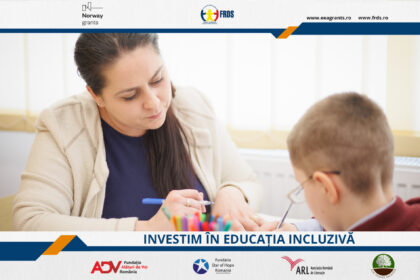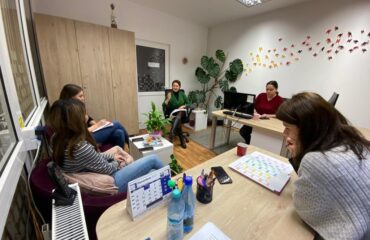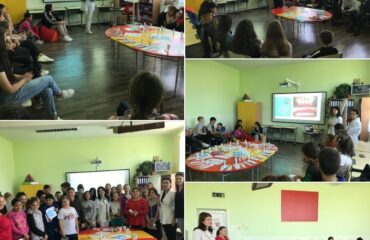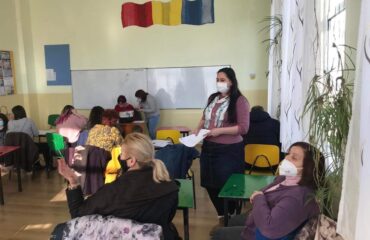
As part of the “investing in Inclusive Education!” project, children and young people at risk of school leaving and with special educational needs shall benefit from an integrated package of services designed to increase their educational and social participation: speech therapy, performing leisure activities and personal development, professional guidance and counselling, psycho-pedagogical services, educational support activities, providing social services and intervention in crisis situations to children/young people and parents. All these services are provided free of charge to the beneficiaries of the target group in four communities – Miroslava, Cornesti, Horlesti – Iasi County and Botosani municipality.
Since we started to provide the logotherapy services, the interest in this type of service has been high. The difficulties of expression and communication are common in children in these communities and are a major factor contributing to the risk of school leaving. We are glad that we have already started to see results and to see that these children enjoy coming to therapy in educational centres – dedicated premises, arranged as part of the project, in the premises of the schools involved in the project.
As we receive a lot of questions related to speech therapy from the parents and teachers of these children, we offer below the informed answers of Ana Dumitriu, speech therapist under the project. Ana has more than 10 years of experience as a speech therapist, she has been practicing in a private practice, in a rural school and in her own cabinet. Since the beginning of 2021, she has chosen to make her contribution and expertise within the ADV Romania, being hired also as an expert for recruiting the target group within the project.

About speech therapy – from A to Z: Interview with Ana-Daniela Dumitriu
What does a speech therapy session involve?
The speech therapy session is a very complex process, which involves stimulating the emergence and development of language, identifying, and recovering the pronunciation difficulties or the speech disorders of children starting with the age of 3 and a half.
Initially, the speech therapist assesses the child’s language, which results in a logopaedic diagnosis, a customized intervention plan is made according to the child’s needs and a work program is established with the parent, and then the actual logopaedic intervention is performed.
The logopaedic sessions contain exercises specific to each disorder: exercises of the phono articulatory apparatus, the pronunciation of syllables, words, sentences, poems, songs, riddles, storytelling by images, the involvement of the child in games that develop attention, intelligence, memory and stimulate verbal reactions.
In our case, these speech therapy sessions must be as varied and as entertaining as possible, so that our beneficiaries (children with special educational needs, children from disadvantaged environments risking leaving school) enjoy coming to us, let us establish relations as fruitful as possible with them, and thus make it easy to correct the problems encountered by playing.
Who needs speech therapy and how is this established?
As a parent, we see the child in all the activities he or she does, and we can easily see if he or she encounters problems in speech, in whatever form they may be: omits, deforms, replaces, reverses one or more sounds; when pronounces correctly an isolated sound but incorrectly when that sound is part of a syllable or word; when the language of the child is unintelligible due to omission or replacement of sounds. In these cases, we need to address a specialist. An assessment will establish if the child needs speech therapy or not.
How long does it take for the progress to be observed? Minimum, maximum. What is the optimal frequency of the sessions? Relate a specific case from your practical experience.
Speech therapy can take several weeks to several years depending on the nature of the problem. Following an evaluation, the speech therapist will be able to estimate the duration of the speech therapy, but I must point out that the work of the speech therapist is in vain if it is not continued at home, no matter how often the speech therapy sessions are held.
I had cases where the parents came to me and told me “To cure their child”, as soon as possible that if he doesn’t speak quickly, he can’t go to school – he fails the test.
A case I am proud of, is the case of Andrei of 4 years old (when he stepped in my cabinet), he did not speak at all, and after a great deal of persuasion with his grandparents, who were sceptical of my age, with parents and child, many tears of frustration from both the child and the adults, after a year of work, with a frequency of 2 times a week, we managed to fulfil the wish of the parents- Andrei succeeded to speak correctly.
Now, when I meet his parents, we are joking, and they say they will bring Andrei to me “to keep him quiet”. I can say that I am proud of my work, and I would like to meet children like Andrei, parents like Andrei’s parents, who haven’t given up for a second and grandparents like Andrei’s, to understand how important is to work together and that only together we succeed.
What factors influence the success of therapy? What patterns did you notice in those progressing quickly? What patterns did you notice in those progressing slower?
Speech therapy can be difficult for some children, and the progress can be slow and frustrating, as I told you earlier in the case of Andrei. But even if it is difficult, perseverance was the factor that influenced the success.
I also believe that it is important, and I strongly insist for the speech and listening to be practiced at home between the visits to the speech therapist. Progress can be seen from one session to another if work is also done at home, the child comes delighted and takes courage, works much better, the parent is pleased.
On the contrary, if we count only on the specialist and the child, the progress is running late, there are frustrations in the case of the parent and the child, the work is much more difficult. I had such cases, too, where work was not continued at home and the child came for my sake to the speech therapy sessions. The child recovered, but very slowly. What could be recovered within a maximum of 3 months took more than 1 year.
The frequency of the speech therapy sessions is also very important. If it was established for the speech therapy sessions to be conducted 2 times a week and the parent brings the child once and then “with the homework not done” progress will be delayed.
What do you like most about this activity?
In general, I like to work with people, which is why I have also chosen this field. This activity – speech therapy, brought me many satisfactions with the cases I had, and seeing that I managed to help more children, that they took great steps in their lives, I like to think I had a little contribution. The spiritual satisfaction is also when we meet and children remember me and that simple, “Thank you” counts enormously for me.
How speech therapy sessions change the children?
The changes are major. Not only does he speak more clearly but also is confident in his or her own forces, gets rid of the accumulated frustrations, learns to write correctly, improves his or her reading and understanding skills, and matures.
Imagine Andrei’s case, if he got to school, did he manage? Of course not. There were frustrations, problems in gathering information, poor performance and, ultimately, early school leaving, and from here sadness, depression, etc.
There have been cases where no progress has been made? If so, why do you think that has happened?
I had only one case where no progress was made, but it was not because of the child, but because of the mother who forgot to bring the child to the speech therapy sessions. The frequency was very low. Mother was working at home, but she came once at 3 – 4 weeks and I had to guide her to another speech therapist.
How can parents help their child in this process? What attitude should they take toward the child? What activities, concrete exercises do you recommend to them?
Parents are a very important factor in this process. Think that a child comes to the speech therapist, where he stays for 1 hour, the rest (23 hours) he spends in kindergarten/school and home. If the parent does not work at home with the child, we do not see progress. I ask the parents to come to the first session with a notebook and then I explain them the reason — homework, for both the child and the parent. I teach the parent to be the speech therapist at home, writing absolutely everything I work with the child during the session, for him to practice at home. Where extra work is needed, I say when he comes to take the child. I always advise them to be patient and firm/ serious when working with the child, to correct the child as often as necessary even if he is protesting. The result is important.
How should teachers communicate with children who have language and speech difficulties? How can they get involved so that recovery is faster and more effective?
Teachers are also very important in the process of recovering the child from the speech therapy point of view. They must be notified by the parent that the preschool/student goes to speech therapy sessions and what is being done in those sessions to continue the work and recover more quickly.
Most often, even these teachers- educators observe the language disorders in children and guide the parent toward a speech therapist. I have always had a very close cooperation with the teachers.
Is there anything else you would like to add?
I would like such projects, such as the one I am now working on “Investing in Inclusive Education!”, to include as many schools as possible. There are many children who need specialists, but who do not have the necessary resources to go to a psychologist, to a speech therapist, to a school counsellor, to a social assistant. All this costs, and many come from disadvantaged families and cannot afford it, but they deserve a helping hand, they are still children, and they deserve a childhood without frustrations. The financial problems they face are enough to also face low performance, frustration, depression, etc., which are not specific to their age.
All children are equal, and all deserve the best, and if we, the ADV can reach out a hand for them, we do it with great warmth, and for that we must thank the man behind who always finds great ideas for those in need – Angela Achitei.
Thousands of thanks to Angela and the ADV team for giving me the opportunity to work on this project and to develop nicely with them.


 Română
Română 

